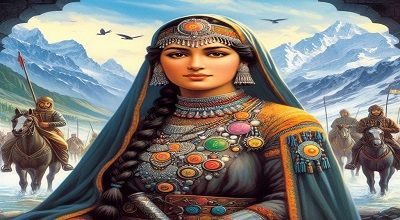History of Dadi Jawari
History of Dadi Jawari: Dadi Jawari holds a unique place in the history of Gilgit-Baltistan, Pakistan, as the first female ruler of the region. Her reign is a testament to the resilience and strength of women in leadership roles, particularly in a period when such positions were typically dominated by men. This essay explores the life, reign, and legacy of Dadi Jawari, delving into the historical context, her governance, and the impact she left on Gilgit-Baltistan.
Early Life and Background
Dadi Jawari’s early life remains somewhat obscure, with limited historical records detailing her formative years. However, it is believed that she hailed from a noble family in the Gilgit region. Her upbringing in a patriarchal society would have posed significant challenges, yet it also instilled in her a sense of duty and leadership.
Birth and Family Heritage
Dadi Jawari was born into a time of political turbulence and territorial disputes in the Gilgit region. Her family, part of the ruling elite, played a crucial role in local governance. This environment undoubtedly influenced her understanding of power and politics from a young age.
Education and Early Influences
Unlike many women of her time, Dadi Jawari received an education that equipped her with the skills necessary for leadership. Her education, combined with the political discussions she was exposed to within her family, shaped her vision for governance.
Ascension to Power
Dadi Jawari’s rise to power was marked by a series of strategic moves and alliances. Her ascent is not just a story of personal ambition but also of the socio-political dynamics of the Gilgit region during her time.
Political Turmoil and Power Vacuum
The death of a ruling male member of her family created a power vacuum. Amidst the ensuing chaos and power struggles, Dadi Jawari emerged as a unifying figure capable of bringing stability to the region.
Strategic Alliances and Support
Dadi Jawari’s ability to forge strategic alliances was crucial in her ascension. She garnered support from influential tribal leaders and neighboring regions, ensuring a broad base of support for her rule.
Reign and Governance
Dadi Jawari’s reign was characterized by a blend of traditional governance and innovative policies. She focused on both internal stability and external diplomacy to strengthen her rule.
Administrative Reforms
One of her significant contributions was the implementation of administrative reforms. She reorganized the local governance structures, ensuring more efficient management of resources and better delivery of services to her people.
Economic Policies
Under Dadi Jawari’s leadership, the region saw a revitalization of its economy. She promoted trade, agriculture, and local craftsmanship, which enhanced the economic stability of Gilgit.
Social and Cultural Impact
Dadi Jawari’s reign also had a profound impact on the social and cultural life of Gilgit. She promoted education, particularly for girls, and supported cultural activities that helped preserve the region’s heritage.
Military and Defense
Recognizing the importance of a strong military, Dadi Jawari invested in strengthening the region’s defenses. She organized a capable and loyal military force to protect her domain from external threats.
Challenges and Opposition
Dadi Jawari’s rule was not without challenges. She faced opposition from rival factions and external threats, but her strategic acumen and diplomatic skills helped her navigate these obstacles.
Internal Dissent
There were elements within her court and the broader society that opposed a female ruler. Dadi Jawari had to continually assert her authority and legitimacy to maintain control.
External Threats
The geopolitical landscape of the region was fraught with dangers from neighboring territories. Dadi Jawari’s diplomatic efforts were crucial in maintaining peace and securing alliances.
Legacy and Impact
The legacy of Dadi Jawari extends beyond her reign, influencing the socio-political fabric of Gilgit-Baltistan for generations.
Empowerment of Women
As the first female ruler, Dadi Jawari became a symbol of women’s empowerment. Her leadership paved the way for future generations of women to aspire to roles in governance and leadership.
Historical Significance
Dadi Jawari’s reign is a significant chapter in the history of Gilgit-Baltistan. Her innovative policies and strong leadership left an indelible mark on the region’s development.
Cultural Resonance
Dadi Jawari’s story continues to resonate in the cultural narratives of Gilgit-Baltistan. She is celebrated in folklore and local traditions as a paragon of strength and wisdom.
Conclusion
Dadi Jawari’s tenure as the first female ruler of Gilgit is a remarkable story of resilience, leadership, and progressive governance. Her legacy is a testament to the potential of women in leadership roles and serves as an inspiration for future generations. By examining her life and reign, we gain a deeper understanding of the historical and cultural dynamics of Gilgit-Baltistan and the significant role played by women in shaping its history.
